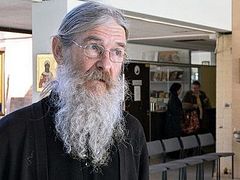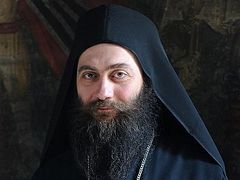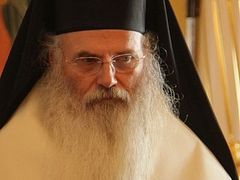Numerous guests—both pilgrims and just “interested people”—come to the Panagia spiritual monastic center at the Finnish town of Lammi. The questions which people address the residents of Panagia are very varied, ranking from seemingly naive and funny to extremely serious ones. Many themes are discussed, but the principal subject, according to the observations of Prof. Hannu Pöyhönen who is already known to our readers, is dedicated to the Heavenly Kingdom. It is so encouraging that meetings with the center’s inhabitants attract ever more participants—it is indicative of a lively interest in Orthodoxy, contrary to the widespread opinion that the “affluent democratic countries” have forgotten God. The fact of these meetings alone indicates people’s honest efforts to remember Christ. We have talked with Hannu Pöyhönen, a co-founder of the Panagia center and Ph.D in Theology, on the permanent spiritual thirst of people and Christ’s desire to quench it without violating our freedom.
—Mr. Pöyhönen, as you say, people very often ask you: “What do the words ‘Thy Kingdom come’ mean?” Why does the theme of the Kingdom of Heaven worry people so much?
—Let me remind you of some of the key points of our previous talks. Then, I said: “In my judgment, Finland is a typical Western country. Christian values are being destroyed with increasing speed. Nothing in modern society encourages a Christian way of life.”
My opinion has not changed. We also spoke about the permanent hunger of the human soul and its longing for God. This yearning has been everywhere and in all times, whether it is Finland, Russia, or Uganda. And it makes us happy to see how people earnestly seek God, sensing (though only instinctively) the falsehood that the world has been trying to impose on them instead of a genuine spiritual life. Human beings are called to be with God, they yearn for their Heavenly Fatherland, and no substitutes will ever work—this is very comforting, yet it commits us to labor. That is why our guests ask very important questions, seeing (I dare to hope) our sincere desire to be closer to God. And the question about our Heavenly Fatherland is one of the most important ones—not in a geographical sense, of course.
—Therefore, people are guided not only by curiosity.
—Thank God there has been very little idle, unnecessary curiosity so far! We see it judging by the questions people ask, whether they are asking us or Athonite ascetics who come to stay in our monastery—for example, Fr. Ephraim, Abbot of St. Andrew’s Skete. You know, idleness will not allow people to ask truly sincere questions. After all, the Heavenly Kingdom is the key subject (and problem) for us Christians both in this life and in the age to come. As I see it, above all else people want to hear and see (with their own eyes) the teaching that is based on experience. Though Fr. Ephraim is not so old, he has lived on Holy Mount Athos for over forty years. Now his spiritual father is one of the most influential and important surviving elders in world Orthodoxy who are still alive and a follower of Elder Joseph the Hesychast, who fell asleep in the Lord in 1959. Thus Abbot Ephraim knows the experience in spiritual life of other ascetics and strugglers for piety as well. Apart from this, he is a brilliant speaker and is able to answer all sorts of difficult questions.
Though indeed some come here out of idle curiosity in order to see a real Athonite monk or an elder. In many cases it turns out that the path towards a spiritual life opens up through curiosity.
Working as a teacher at the Orthodox college of New Valamo Monastery [of the Holy Transfiguration, situated in Heinävesi, Finland.—Trans.] for sixteen years—it’s Finland’s center of Orthodox spirituality—I have heard (and seen with my own eyes) many stories of the conversion to Orthodoxy by representatives of other faiths many years after their visit to one or another monastery. These people were baptized in the very monasteries that they had visited for the first time years before. So the seed sown as a result of “mere curiosity” may bear fruit in due course. Let us take this into account when we encounter people who know very little about Christianity.
—What do guests from Mt. Athos talk about? Do discussions with them or with you take place? Or maybe even debates?
—The key subject, the quintessence of our meetings and talks with our guests is the Kingdom of God and the Second Coming of Christ, which won’t be the beginning of a new era or some particular place, but will become a spiritual reality in its truest and fullest sense. The Kingdom of God is within you (Lk. 17:21), Christ says in the Gospel of Luke. We either live in the sphere of the influence of the Heavenly Kingdom or in exile from it. Where there is Christ, there is the Kingdom of God. Without Him the Kingdom of God is unattainable to us.
Elder Ephraim puts special emphasis on the importance of our spiritual cleansing. It is done step by step, to a merciless “bombardment” by the grace of God of the human passions that rage inside us. At some points we can feel the mercy of God, but sometimes grace leaves us. The purpose of this “providential abandonment” is that we should come to realize our weakness and learn humility. Let us recall the words of Christ: Without Me ye can do nothing (Jn. 15:5). Through purification and humility we reach a higher spiritual level. When we reach the summit in this spiritual ascent, Divine grace will abide in us permanently. Such people live in Paradise, in the Kingdom of God, already in this life. By the mercy of God we are cleansed, but it is never done without the participation of our freewill, because God never treads on human freedom and never violates it. You know, God is very considerate and tactful.
Elder Ephraim also speaks about the distorted understanding of the Kingdom of God. Among others, he mentions the Chiliasts who believed that the Second Coming of Christ will be preceded by a thousand-year period of “Paradise on earth”. According to Fr. Ephraim, the “thousand years” of Christ’s reign on earth began after His Resurrection and will continue up until His Second Coming (all wars and catastrophes included).
During our talks we often touch upon the theme of the dogmatic differences between the Orthodox and the Roman Catholic teachings on the salvation of man, taking the Transfiguration of the Lord (when His disciples experienced the foretaste of the Kingdom of God for the first time) as an example. Thus, opposed to Western teaching, Orthodoxy teaches that there is a difference between the essence of God and His grace. God, Who is unknowable by people and angels alike, can touch us through His energies. It is they that transform us, enlighten us and make us God-like in such a way that people begin to radiate Divine energies as well—let us take St. Seraphim of Sarov, for example.
The Roman Catholic Church interprets the light radiated by the Transfiguration of the Lord as a created phenomenon, whereas the Orthodox Church adopted the teaching of the uncreated nature of the light on Mt. Tabor. Nothing that proceeds from God can be “created”, and no created thing can illumine and save us. For Orthodox Christians, salvation comes through synergy (participation) in the Divine energies of Christ. Our visitors perceive these topics that we raise in our conversations as completely novel and it certainly makes them think deeper about very many things.
—Have you witnessed any happy discoveries? Have you ever sensed in their eyes, words and faces that the Kingdom of God is not so much our topic of conversation as our real Fatherland?
—Yes, glory be to God. For instance, occasionally we organize open evening talks with our guests from Mt. Athos. During our previous meeting with Elder Ephraim, every guest could ask him questions—any pressing questions from their lives. There were lots of interesting questions, and the answers were very informative too. We had the opportunity to gain knowledge from the living and deep source of our Church, particularly about the nature of angels, after-death “toll-houses”, the nature of the Kingdom of God and our exile from it, along with the forgiveness of sins recurring during a human life.
And I see spiritual renewal on the faces of the listeners. Many sincerely express their thanks to us. One man wrote after a workshop: “I thank you for this opportunity of coming to us. Now I can see many things in my life more clearly.” And another person wrote: “I thank God, I thank you all. I am grateful to Elder Ephraim. By the mercy of God he has taught us again. Despite my falls, the merciful Lord has allowed me to visit you. Every time I feel the presence of Divine grace at your center.” Feedback like this encourages us a lot and gives us more strength in our strenuous daily work. Monasteries and spiritual centers are not founded for “purely personal purposes”. Their mission is to help people grow closer to God. Monasteries are very important to pilgrims in our difficult times in particular. Both monks and laypeople share the same objective—to reach the Kingdom of God. In order to walk this difficult path we need a “special diet”, “vitamin injections”, and sometimes even “surgical operations”. We need to have wisdom in order to find a place where we will receive real spiritual help. By the way, I am positive that there are plenty of opportunities for this in Russia. And I even envy you a little, in the good sense of the word.





